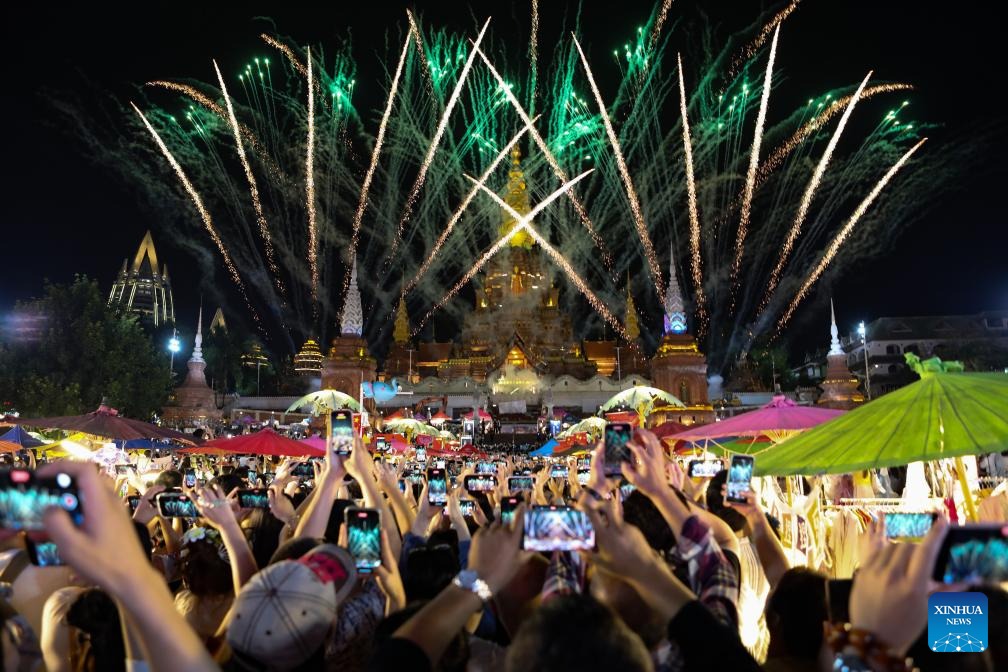Barber creates stylish new looks in Xizang
Hairdressing culture leads fashionable trend in male grooming on plateau


Rapid social transformation and improved standards of living are prompting many men to pay closer attention to their external appearance, making a fashionable barber in Lhasa in the Xizang autonomous region increasingly popular.
Barber culture found its home in the plateau city only four to five years ago. Unlike ubiquitous hairdresser shops in Lhasa's streets, barbershops were rare.
Hailing from the city of Shigatse in the region, Ngakwang Jigdrak graduated from Beijing University of Posts and Telecommunications in 2020. After three years working at China Mobile, he established Jin's Barbershop last year.
Ngakwang Jigdrak developed a passion for barber culture during his college years and underwent training at a barbershop named All-city in Beijing.
"I didn't attend many classes in my third year of college, which allowed me to take barber lessons. I primarily apprenticed under an experienced barber to learn basic skills and the cultural aspects of barbering," Ngakwang Jigdrak said.
After mastering hairdressing techniques, he initially practiced on his classmates without charge. As his expertise grew, more students sought his services offering to pay or provide him with free meals.
Despite many of his former classmates opting for civil service careers, Ngakwang Jigdrak used an investment of 50,000 yuan ($6,900) to open his first barbershop in Lhasa last year.
"For me, being a barber is a passion. That's why I chose this profession," Ngakwang Jigdrak said, emphasizing the importance of pursuing what one loves to make life more meaningful and interesting.
Starting a business presented challenges, including parental opposition, inadequate investment, and a lack of experience.
However, his unwavering determination to realize his dream bolstered him through initial setbacks, leading to the successful establishment of his business.
Encouraged by government initiatives for university graduates in entrepreneurship through policies and financial aid, Ngakwang Jigdrak applied to the Lhasa Social Security Bureau for additional support.
Despite the initial scarcity of customers due to the barbershop's remote location, strategic promotion on short-video platforms such as Douyin and Kuaishou gradually expanded his customer base. Most patrons, including government officials, prefer weekend or lunchtime visits, with the shop typically closed on Mondays.
In addition to officials, the shop is also frequented by college students, elderly individuals and tourists. Through his adept use of new media for promotion, Ngakwang Jigdrak has cultivated a loyal customer base, with over 20 regular clients visiting monthly.
Ngakwang Jigdrak explained that a barber differs from regular hairdressers in several ways. For example, in a typical hairdressing salon, a customer is passed from one staff member to another for different services, whereas in a men's barbershop, a barber serves the customer throughout the entire process.
"A barber places a strong emphasis on communication with customers, focusing on maintaining a continuous dialogue throughout the service, from hair washing to the customer's departure," he said.
If a customer is a repeat visitor, the barber can continue the previous conversation during the next visit, fostering a friendly and personal relationship beyond a transactional one.
According to him, barbers also pay close attention to details, requiring customers to make appointments in advance and adhere to scheduled times. Therefore, the profession of a barber is not just about cutting hair but is closely related to disciplines such as sociology, anthropology and education.
"For instance, when a customer is unhappy, the barber must learn to comfort them and help them forget their worries, resulting in some customers becoming his friends," he said.
"I am more interested in the culture embedded within the profession of barbering, which is why I chose this job. I also aim to promote the culture of male barbers on the snowy plateau," he added.
Currently, there are more than a dozen men's barbershops in Lhasa, with most operated by owners from other provinces.
To better serve customers, Ngakwang Jigdrak ensures he has sufficient rest in order to be in a spirited state when attending to clients.
Compared to other coastal cities and regions in China, the concept of a barber and its cultural significance developed relatively late in Xizang. As a result, many residents are still unfamiliar with it.
Witnessing the transformation of unkempt hair into a work of art brings Ngakwang Jigdrak pride and joy, especially when he sees the satisfied smiles on his customers' faces.
Discussing his plans, Ngakwang Jigdrak expressed his intention to operate a larger men's barbershop in a more favorable location in Lhasa.
"Additionally, I hope to recruit apprentices to pass on my skills and further enhance my own expertise," he added.
palden_nyima@chinadaily.com.cn





































